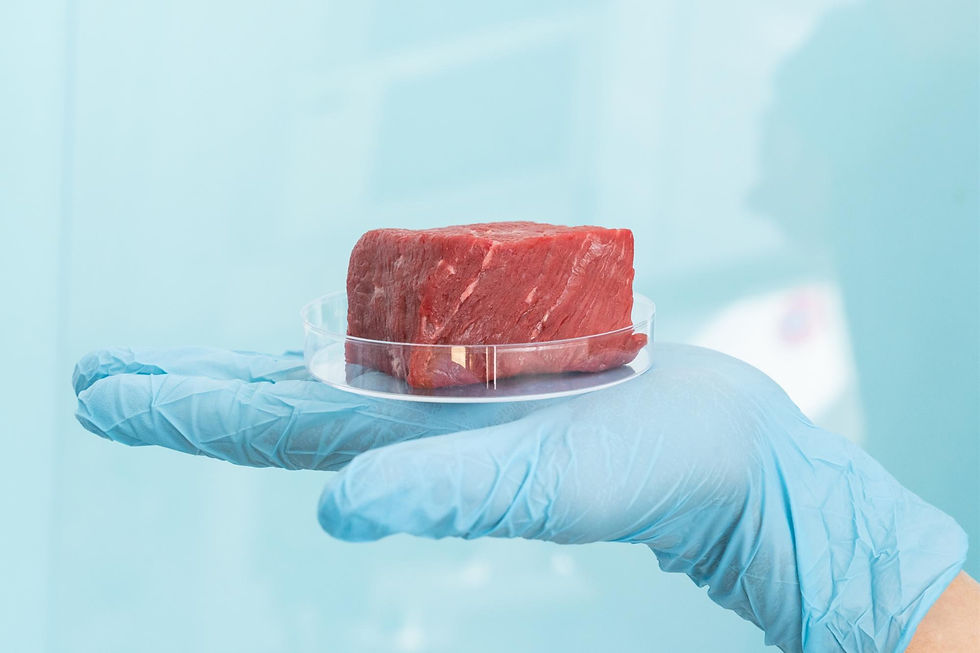The Battle Over Cultivated Meat: Cult Food Science's Plea to Governor DeSantis
- Jul 10, 2024
- 4 min read

Introduction
The advent of cultivated meat has stirred significant debate within the food industry, regulatory bodies, and the general public. Recently, Cult Food Science, a leading company in the field of cultivated meat, penned a compelling letter to Governor Ron DeSantis of Florida, challenging the state's stance on banning cultivated meat. This article delves into the context of this controversy, the arguments presented by Cult Food Science, and the broader implications for the future of food technology.
Understanding Cultivated Meat
Cultivated meat, also known as lab-grown or cultured meat, is produced by cultivating animal cells in a controlled environment. This innovative approach aims to replicate the texture, taste, and nutritional profile of traditional meat without the need for animal slaughter. Proponents argue that it offers a sustainable solution to the environmental and ethical concerns associated with conventional meat production.
Florida's Stance on Cultivated Meat
In a surprising move, the state of Florida, under the leadership of Governor Ron DeSantis, has considered implementing a ban on the sale and production of cultivated meat. The proposed legislation has sparked a wave of reactions, with advocates for food innovation expressing their discontent.
Cult Food Science's Letter to Governor DeSantis
In response to the proposed ban, Cult Food Science composed a detailed letter to Governor DeSantis, outlining their objections and presenting a case for the acceptance of cultivated meat. The letter emphasized several key points:
1. Environmental Impact: Cult Food Science highlighted the environmental benefits of cultivated meat. Traditional livestock farming is a major contributor to greenhouse gas emissions, deforestation, and water usage. Cultivated meat, on the other hand, promises a significantly lower environmental footprint.
2. Public Health: The letter underscored the potential public health advantages of cultivated meat. By producing meat in a sterile environment, the risk of foodborne illnesses and antibiotic-resistant bacteria can be greatly reduced.
3. Economic Opportunities: Cult Food Science argued that embracing cultivated meat could position Florida as a leader in food technology, attracting investment and creating high-tech jobs. The burgeoning industry holds the promise of economic growth and innovation.
4. Ethical Considerations: The ethical implications of meat consumption were also addressed. Cultivated meat offers a humane alternative to traditional meat production, potentially reducing animal suffering and aligning with growing consumer demand for ethically produced food.

The Broader Implications
The debate over cultivated meat in Florida is not an isolated incident but part of a larger conversation about the future of food. As the global population continues to grow, finding sustainable and ethical ways to produce food becomes increasingly critical. The response to Florida's proposed ban will likely influence other states and countries grappling with similar issues.
The letter from Cult Food Science has garnered attention from various stakeholders, including environmental groups, public health advocates, and the food industry. While some support the ban, citing concerns about food safety and naturalness, others view it as a step backward in the pursuit of sustainable food solutions.
Governor DeSantis has yet to make a final decision, but the growing discourse suggests that the outcome will have far-reaching implications. Should Florida proceed with the ban, it may face legal challenges and pushback from the scientific community and industry leaders.
The controversy surrounding cultivated meat and the proposed ban in Florida highlights the complexities of balancing innovation, regulation, and public interest. Cult Food Science's letter to Governor DeSantis is a pivotal moment in this ongoing debate, emphasizing the need for thoughtful consideration of the potential benefits and challenges of new food technologies. As the world watches, the decision made in Florida could shape the future of cultivated meat and set a precedent for other regions navigating the same uncharted waters.
Read the full letter below:
Dear Governor DeSantis; Speaker Renner; and Senate President Passidomo:
The science and evidence around cultivated meat is clear: it is both safe for consumption and environmentally friendly. With more risks than ever to the climate, cultivated meat is no longer an alternative but rather a necessity. Policymakers need to be embracing sustainable protein production and not trying to put up regulatory obstacles towards its adoption. Jeff Bezos and the Bezos Earth Fund recently have made two breakthrough commitments to new facilities aiming to accelerate research and development of cultivated meat at the Imperial College of London and North Carolina State University. The United States military has also recently announced their intent to pursue cultivated meat as a source of protein for troops. The facts are clear: factory farming consumes too much land and produces too many greenhouse gases. And the global demand for meat is growing, not decreasing. That’s why cultivated meat is the answer. It is real, genuine animal meat simply made through different production methods.
The notion that this meat is fake or unhealthy is simply wrong. The FDA has approved cultivated meat for human consumption and yet policymakers at the State level are trying to impede the progress of this innovative industry. Food production is simply not sustainable if it harms our environment and emits greenhouse gases which are significantly more harmful than carbon dioxide emissions.
Decisions about what to consume or purchase should be left to the market and consumers, not dictated by legislation that hampers progress and competition. Restricting the sale and production of cultivated meat products denies Floridians access to these innovative products and limits consumer choice. CULT Food Science appreciates the opportunity to provide its perspective regarding this important issue.
Decisions about what to consume or purchase should be left to the market and consumers, not dictated by legislation that hampers progress and competition. Restricting the sale and production of cultivated meat products denies Floridians access to these innovative products and limits consumer choice. CULT Food Science appreciates the opportunity to provide its perspective regarding this important issue.


Comments